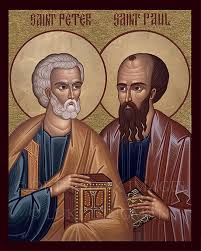HOMILY – SOLEMNITY of SAINTS PETER AND PAUL
Apostles of Forgiveness and Evangelization
(Acts 12:1-11; Ps 34; 2 Tim 4:6-8;17-18; Mt 16:13-19)
***************************************************
Today’s solemnity invites us to reflect on two foundational figures of the early Church, to be inspired by them and to learn from them.
 St. Peter and St. Paul met only a few times. Their relationship was sometimes rocky, due to strong personalities and disagreements, yet they had much in common: both were called directly by Jesus; both were powerful preachers leading people to faith and conversion; both were persecuted and released from jail miraculously; both were visionaries and had visions that influenced their ministry; both exercised the gift of healing; both were martyred in Rome and both were focused on proclaiming Christ to the nations – Peter more to the Jews and Paul more to the Gentiles.
St. Peter and St. Paul met only a few times. Their relationship was sometimes rocky, due to strong personalities and disagreements, yet they had much in common: both were called directly by Jesus; both were powerful preachers leading people to faith and conversion; both were persecuted and released from jail miraculously; both were visionaries and had visions that influenced their ministry; both exercised the gift of healing; both were martyred in Rome and both were focused on proclaiming Christ to the nations – Peter more to the Jews and Paul more to the Gentiles.
They can teach us to tolerate differences in ministerial style and approach, and to stay focused on the message of Jesus as Risen Lord and Savior, as the Messiah who was to come. What Jesus said to Peter was said to the whole Church, because he represents the Church – forgive. The role given to Paul was given to all of us, because he also represents the Church – evangelize.
Forgiveness is the core of the Christian message, and at the heart of our life as a Church. It is as if Jesus said to Peter, we must become forgiveness and not just forgive a few times. It must be part of our DNA and ooze out of us, because God is forgiveness. Matthew 18:15 is the passage where Jesus not only teaches us the importance of forgiveness, but also how to forgive: “When someone in the church hurts you, go to them alone and point out their fault.” I prefer “tell them how you feel about their hurtful behaviour, and then let it go.” If Matthew was writing today, with a greater awareness of the power of emotions, I believe that is how he would put it.
The essence of forgiveness is taking in hurtful dark energy, pondering it, sharing our hurt feelings with a trusted other, praying that God will transform our anger into forgiveness, then giving those painful emotions back to the one who stirred them up in us, with love, like Jesus on the cross – “Father, forgive them, they know not what they do.”
When we act like Jesus, we get to feel like Jesus. Our dignity, innocence, self-esteem and self-worth all come back, because we are just like Jesus on the cross. And when we act like God, we get to feel like God – peace and joy.
The core of evangelization is sharing the good news of salvation with others. The word comes from the Greek word euaggelizó meaning a bringer of good news. When a military commander in Roman times won a battle, he would send messengers ahead to the city to announce the good news of his victory. To evangelize and announce that Jesus was the true victor bringing real victory to the people at that time was actually subversive – the real victor was not Caesar, but Jesus. It is the same in our day – it is Jesus who is the real saving power, one that no other power in this world can touch.
Don at a rehabilitation centre for alcoholism took an addictions awareness course on the 12 Step program I gave there seriously. As a way of doing Step 6, he wrote letters to 13 people either trying to forgive them, or asking for forgiveness for all his hurtful acting-out behaviour in the past. He gave me one to his mother I still use to this day as a model. In it he shares all his hurt, anger, rage, suicidal thoughts and even hatred he felt towards her for her hurtful behaviour towards him, without any trace of revenge, getting even or punishing her. It was pure love as forgiveness. In the end he pleads with her to deal with her demons, says he is trying to forgive her, and ends by telling her he loves her. He is truly living the gospel that Peter experienced and preached.
On a journey to India, I was able to enter into inter-religious dialogue with a Hindu computer programmer (right after reading an article on that topic!) What an opportunity to put into practice what I had read. I asked him what his relationship with his gods was like (very much based on paying for sacrifices) so not a deep relationship. I was then able to share with him my relationship with God as Father, Son, Holy Spirit, family, unconditional love and intimate relationship. As we landed, I felt like St. Paul – I had evangelized someone in a friendly, respectful way – and experienced some of the joy both Paul and Peter must have experienced in their ministry.
The Eucharist we celebrate on this solemnity not only reminds us of these two pillars of our faith, but hopefully will also empower us to imitate both Peter and Paul by our ability to forgive as well as our willingness to share our faith and evangelize.



